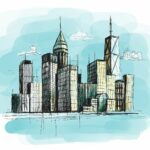
Why People and Businesses Should Be Concerned About the State of Councils.
April 14, 2024
Commercial Awareness Update – W/C 15th April 2024
April 15, 2024By Abigail Wonga.
Reading time: three minutes
In April 2024, The Student Lawyer’s D&I team are marking the 23rd anniversary of Sexual Assault Awareness Month (SAAM). This article is part of a series of work that raises awareness and educates about SAAM.
“A lot of people think that intersectionality is only about identity. But it’s also about how race and gender are structured in particular workforces.” Kimberlé Williams Crenshaw
What is Intersectionality?
Intersectionality is term coined by Kimberlé Williams Crenshaw; the Black American civil rights advocate and current professor at the UCLA School of Law and Columbia Law School. Crenshaw specialises in race and gender issues and defines intersectionality as being, “a metaphor for understanding the ways that multiple forms of inequality or disadvantage sometimes compound themselves and create obstacles that often are not understood among conventional ways of thinking.”
Using the ideology of feminism which explores the inequalities women face in the patriarchal world. Intersectionality by definition is its product, which is more representative of all kinds of women. Intersectionality provides greater representation of women – racially, ethnically, religiously, socioeconomically and many more.
Concerning the legal aspect, in the UK, according to the Solicitor’s Regulation Authority (SRA), 3% of lawyers are Black. According to the Guardian, in October 2022, it was reported that only 90 out of 13,000 partners in the United Kingdom are Black. This indicates how much of an underrepresentation there is of Black lawyers and partners combined. However, what can be inferred about Black female lawyers and partners? It is just as low. For centuries, Black and other ethnic women have been defined by their roles as labourers. These women are expected to play a more subservient role by raising the children and taking care of the husband. Crenshaw’s definition of intersectionality aims to dismantle perpetual stereotypes against underrepresented women, providing them with a space where they can be whatever they want.
Since 2020, where the murder of African American George Floyd raised significant flaws of racism, including institutionally, UK law firms have implemented some changes when considering giving those from disadvantaged backgrounds employment.
The Financial Times lists firms including Ashurst, Linklaters, Hogan Lovells, BCLP, tackling ethnic diversity through ‘’Bame-owned recruitment firms to identify candidates beyond traditional avenues.”, “increased its ethnic minority graduate intake from 10% in 2010 to 30% from 2015.”, and, “Bame-owned recruitment firms to identify candidates beyond traditional avenues.”
With successful discussions, it is more likely in the future there will be an increasing amount of lawyers from BAME backgrounds, yet the current statistics of BAME lawyers remain low and needs room for improvement.
Intersectionality and Sexual Violence
The #MeToo movement came to prominence after many actresses came out and revealed the gross misconduct of then-director, Harvey Weinstein. Several actresses, workers and personal assistants have made claims against Mr Weinstein citing him as being inappropriate, sexually assaulted and some, raped. But, one known Hollywood actress, Lupita Nyong’o came out and detailed her time with Harvey Weinstein and all chaos had transpired. Out of all the victims that revealed Harvey Weinstein’s heinous crimes, his team personally responded to Lupita Nyong’o. “Mr Weinstein has a different recollection of the events but believes Lupita is a brilliant actress and a major force in the industry.”
Last year, she sent a personal invitation to Mr Weinstein to see her in her Broadway show ‘Eclipsed.” A statement submitted by Weinstein’s team to Variety in response to Nyong’o’s essay, this provides sentiment as to why intersectionality is crucial when discussing sexual violence.
To find out about the legal protections available for survivors, read this article: ‘Legal Protections for Survivors: Safeguarding Rights and Recovery | The Student Lawyer’
The statistics of sexual violence being reported in the UK remain low, due to the mistrust women have towards the police when dealing with such matters. Yet, it is even dire for ethnic minority women. Stereotypes to do with the over-sexualisation of marginalised women and being ‘too strong’ play a role.
To find out more about sexual violence in the workplace, read this article: ‘Addressing Sexual Violence in the Workplace’
Resources
Every April, Sexual Assault Awareness Month (SAAM) shares the message that prevention is possible and if you have been affected by sexual assault, that there are points of contact in the UK such as Rape Crisis, Women’s Aid, the rape and sexual abuse support line by Rape Crisis England and Wales. Additionally, sexual assault referral centres (SARCs) offer medical, practical and emotional support to anyone who has been raped, sexually assaulted or abused.
To anyone reading this and has been affected, please know that are resources and qualified help to assist you with challenges.
To find out more about SARCs, read this article: Legal Protections for Survivors: Safeguarding Rights and Recovery | The Student Lawyer
References
- https://www.nhs.uk/live-well/sexual-health/help-after-rape-and-sexual-assault/
- https://variety.com/2017/biz/news/lupita-nyongo-harvey-weinstein-sexual-harassment-1202594789/
- https://www.ft.com/content/e4eeef88-e994-4fdd-8b9d-0d02b647ee45





